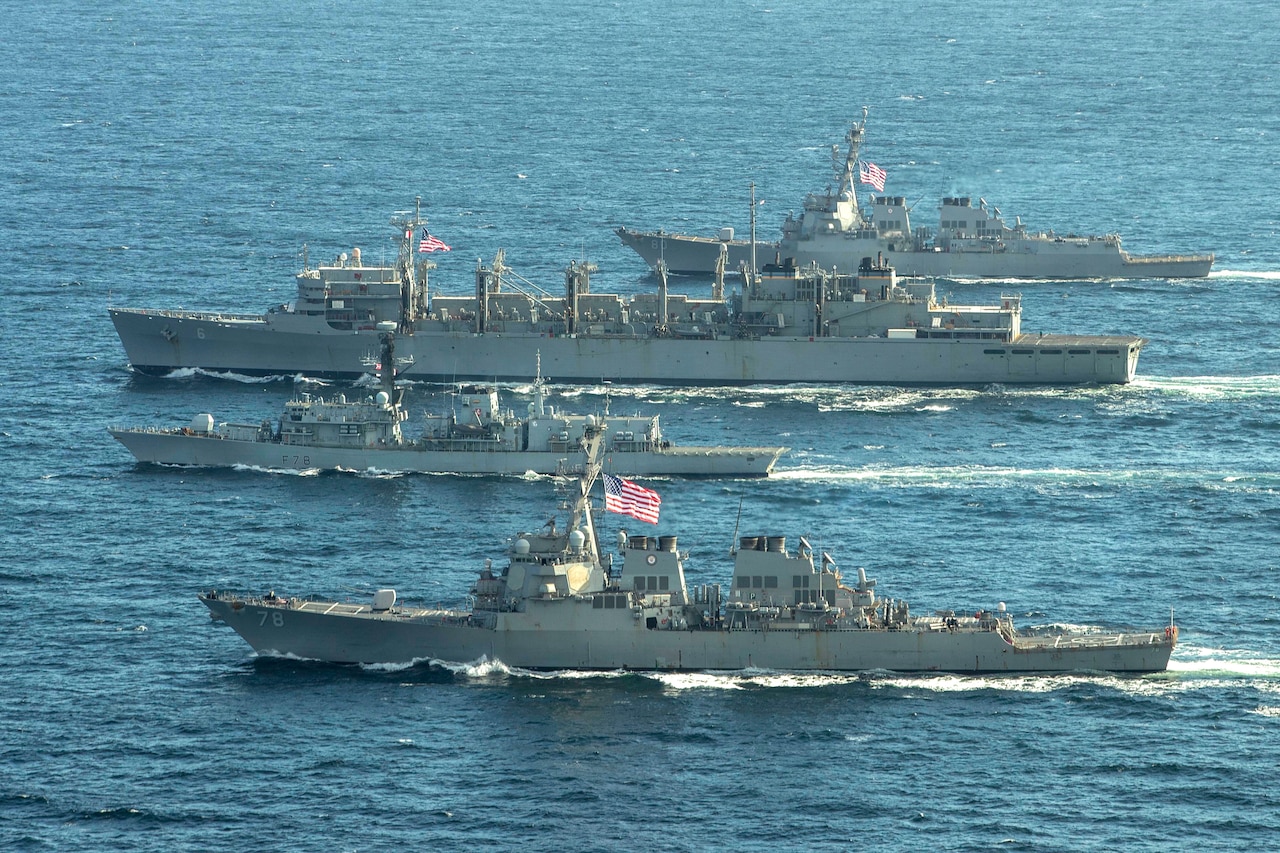May 7, 2020 | BY JIM GARAMONE , DOD News
A U.S. and British exercise underway in the Barents Sea
highlights the importance of the Arctic region in a time of climate change.
"Three Arleigh Burke-class Aegis destroyers — USS
Donald Cook, USS Porter and USS Roosevelt — are supported by fast combat
support ship USNS Supply and joined by the Royal Navy's HMS Kent to assert
freedom of navigation and demonstrate seamless integration among allies,"
a U.S. Navy news release said.
This is the first U.S. exercise in the Barents Sea since the
mid-1990s, Navy officials said.
Climate change is affecting every country on the globe, and
the U.S. military must adapt to provide defense, officials said. Whether it is
increasingly dangerous floods, longer-lasting droughts, more and more powerful
hurricanes, typhoons or cyclones, service members must change to operate and
win in these new environments, they added.
Climate change is particularly fast in the colder regions of
the globe, with glaciers and ice caps melting at alarming levels. That change
means new operational environments.
For centuries, explorers looked for the fabled Northwest
Passage from Europe across the top of North America to the Pacific. The straits
and islands and bays still bear the names of Hudson, Frobisher, Ellesmere and
Cook. Many explorers died looking for the water passage, but the Arctic ice cap
was too large. It wasn't until the early 20th century that Norwegian explorer
Roald Amundsen, the first man to reach the South Pole, navigated a small boat
from the Pacific to the Atlantic.
But climate change has opened that possibility. The Arctic
ice cap is shrinking, and there is the possibility that a route may open for at
least part of the year. The Arctic region above Russia is seeing the same
warming trend.
The first commercial ship to transit the Northwest Passage
was the SS Manhattan in 1969. The ship — refitted with an icebreaker bow — was
an oil tanker testing to see if the route would work for carrying Alaskan crude
out of Point Barrow.
But ships without special fittings can now transit the
passage. In 2016, the passenger liner Crystal Serenity sailed from Vancouver,
British Columbia, to New York City using the route. It took 28 days.
In 2013, the first commercial bulk carrier transited the
passage. The MS Nordic Orion carried a cargo of coking coal from Vancouver to
the Finnish port of Pori.
All this presents new geostrategic challenges, said Navy
Adm. James Foggo, the commander of U.S. Naval Forces in Europe and the
commander of NATO's Allied Joint Force Command in Naples, Italy.
"The High North is attracting global interest, with
abundant natural resources and opening maritime routes," Foggo said in an
article in Defense One.
Russia — with its long coastline on the Arctic Ocean — is
aggressively seeking to assert its preeminence in the region. The Russians
recently unveiled a new icebreaker, the Ivan Papanin, that can carry Kalibr
cruise missiles. "Who puts missiles on icebreakers?" Foggo asked.
Russia is also deploying surface ships and new hybrid
Kilo-class submarines. "We're seeing the Russians deploy more submarines
in the North Atlantic, and these subs are deploying for longer periods of time
and with more lethal weapon systems," the admiral said.
The Soviets had outposts all along its Arctic coast. These
were abandoned following the dissolution of the Soviet Union. But Russia has
returned to Soviet-era outposts and built new military facilities above the
Arctic Circle.
Russia at least borders on the Arctic Ocean. China calls
itself "a near-Arctic nation" and seeks to assert its rights in the
region. The Chinese are calling for freedom of navigation in the Arctic, even
as they try to suppress that right in the South China Sea.
There will be more deployments and more exercises in the
High North, Foggo said. "The Russians are operating with state-of-the-art
nuclear submarines," he said. "That said, we still have the
competitive advantage. But they're good, and getting better."

No comments:
Post a Comment